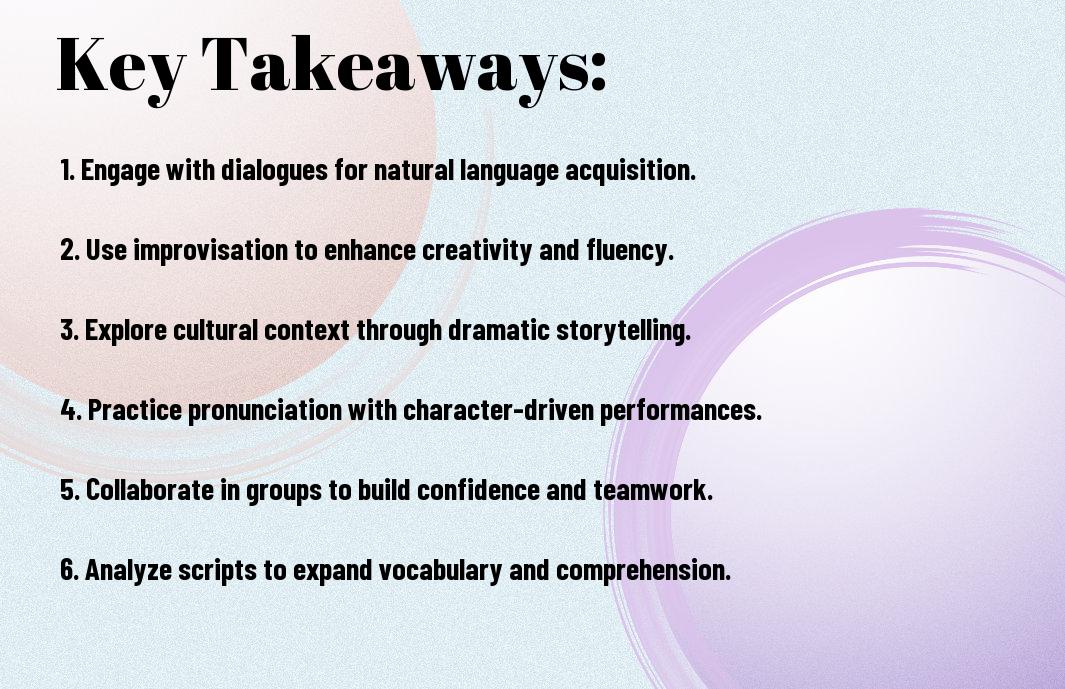You can acquire a new language in a unique and engaging way by leveraging the power of theater and drama. As you explore this method, you’ll discover that it enhances your vocabulary, pronunciation, and comprehension skills. Your language learning journey will become more enjoyable and interactive, allowing you to express yourself in a more authentic and creative way. You will be able to tap into your emotional and cognitive abilities to connect with the language on a deeper level.
Key Takeaways:
To learn a language through theater and drama, consider the following points:
- Immerse yourself in authentic materials by watching plays, musicals, and theater productions in the target language to get a feel for how the language is used in context.
- Engage in role-playing activities that involve acting out scenarios, improvising, or performing scripted scenes to practice speaking, listening, and comprehension skills in a dynamic and interactive way.
- Use drama techniques such as mime, puppetry, or storytelling to convey meaning and emotion, and to develop creative and expressive language skills, making the learning process more enjoyable and effective.
Language Learning Basics
The foundation of learning a language through theater and drama begins with understanding the principles of language acquisition. You will need to develop skills in reading, writing, listening, and speaking, and theater provides a unique opportunity to practice these skills in a creative and engaging way.
Language Foundations
Contrary to what you may think, learning a language through theater and drama can be an effective way to build your language foundations. You will be exposed to new vocabulary, grammar, and pronunciation, which will help you develop a strong base in the language.
Setting Goals and Motivation
Beneath the surface of language learning lies the importance of setting achievable goals and maintaining motivation. You need to define what you want to achieve through learning a language and use theater and drama as a tool to stay motivated and engaged.
For instance, you can set a goal to perform a monologue or a scene in the target language, which will give you a sense of purpose and direction. As you work towards your goal, you will be motivated to learn new vocabulary, practice your pronunciation, and improve your comprehension, all while having fun and being creative.

The Power of Theater
You can unlock the secrets of language learning through theater by exploring the resources available, such as the guide on How to Learn a Language Through Theater and Drama, which provides valuable insights to support your journey.
Immersive Storytelling
Before submerging into the world of theater, you’ll find that immersive storytelling helps you connect with the language on a deeper level, making it easier to understand and retain new vocabulary and grammar rules.
Cultural Enrichment
The cultural context of theater provides a unique opportunity for you to learn about the customs, traditions, and history of the language you’re studying, giving you a more nuanced understanding of the language.
A key aspect of cultural enrichment through theater is the exposure to various accents, dialects, and linguistic variations, allowing you to develop your listening and speaking skills in a more engaging and effective way, and enabling you to sound more natural and fluent in your language of choice.

Acting and Improvisation
For language learners, acting and improvisation can be a fun and engaging way to practice your skills. You can join a theater group or take an acting class to get started, and you’ll be amazed at how quickly your language skills improve as you take on new roles and characters.
Building Confidence
By stepping out of your comfort zone and onto the stage, you’ll build confidence in your language abilities and develop a more authentic accent and tone. You’ll learn to think on your feet and respond to unexpected situations, just like in real-life conversations.
Creative Expression
At the heart of acting and improvisation is creative expression, which allows you to convey emotions and ideas in a unique and personal way. You’ll discover new ways to express yourself and bring your language skills to life through movement, voice, and gesture.
With creative expression, you’ll find that your language learning experience becomes more enjoyable and interactive. You’ll be able to tap into your imagination and creativity, and develop a more nuanced understanding of the language and its cultural context. As you explore different characters and scenarios, you’ll gain a deeper appreciation for the language and its many possibilities, and you’ll be surprised at how quickly your skills improve.
Script Analysis and Interpretation
Now that you have your script, you can investigate into analysis and interpretation, exploring how language is used to convey meaning and emotion. You can find more information on this topic in FAQs: Learning Languages through Drama. – ERIC, which provides valuable insights into using drama for language learning.
Character Development
Across the script, you will encounter various characters, each with their own unique voice and language patterns, allowing you to develop your understanding of language in context and improve your own expression.
Language Nuances
Between the lines, you will discover subtle language nuances, such as idioms, colloquialisms, and figurative language, which will help you better comprehend the complexities of language and improve your communication skills.
Indeed, as you explore language nuances, you will begin to appreciate the richness and diversity of language, and your ability to pick up on these subtleties will significantly enhance your language proficiency, enabling you to express yourself more effectively and engage in more meaningful interactions.
Performance and Practice
After dedicating time to learning lines and understanding the plot, you will start to practice your performance, bringing your language skills to life on stage.
Rehearsals and Feedback
Rehearsing regularly helps you refine your pronunciation, intonation, and fluency, allowing you to receive constructive feedback from your instructor or fellow actors to improve your performance.
Overcoming Stage Fright
On the day of the performance, you may feel nervous, but with thorough preparation, you can manage your anxiety and focus on conveying the emotions and message of the play.
Overcoming stage fright is a process that takes time and practice, and as you continue to perform, you will become more confident in your language abilities, allowing you to express yourself more effectively and connect with your audience on a deeper level, making your language learning experience more enjoyable and rewarding.
Resources and Opportunities
Despite the challenges of learning a language, you can find numerous resources to help you achieve your goal through theater and drama. You can explore various options, such as language schools, programs, and theater groups, to improve your skills.
Language Schools and Programs
The availability of language schools and programs that incorporate theater and drama into their curriculum can provide you with a structured learning environment, where you can practice your language skills while exploring your creativity.
Theater Groups and Communities
By joining theater groups and communities, you can engage with like-minded individuals who share your passion for language and drama, and participate in productions, workshops, and other activities that will help you improve your language skills.
Theater groups and communities offer you a unique opportunity to immerse yourself in the language and culture, as you work together with others to bring a production to life, and you can take on various roles, such as acting, directing, or writing, to challenge yourself and enhance your language skills.
To wrap up
Following this guide, you will be well on your way to learning a language through theater and drama. You can apply your language skills in a creative and engaging way, making the learning process more enjoyable. As you participate in plays, you will improve your pronunciation, intonation, and comprehension, allowing you to become a more confident language speaker, and enhancing your overall language abilities. Your language skills will flourish in a unique and exciting way.
FAQ
Q: What are the benefits of learning a language through theater and drama?
A: Learning a language through theater and drama provides an immersive and engaging experience, allowing learners to develop their language skills in a creative and interactive way. By participating in plays, skits, and other dramatic performances, learners can improve their pronunciation, intonation, and fluency, as well as enhance their comprehension and vocabulary. Additionally, theater and drama provide a unique opportunity to practice language in a contextualized and meaningful way, making the learning process more enjoyable and effective.
Q: How can I get started with learning a language through theater and drama?
A: To get started with learning a language through theater and drama, you can begin by finding language learning groups or classes that incorporate drama and performance into their curriculum. You can also look for local theater companies or community centers that offer language classes or workshops that focus on theater and drama. Another option is to watch and participate in online language learning videos or podcasts that use drama and storytelling to teach language. Furthermore, you can practice at home by acting out scenes, creating your own skits, or even just practicing monologues in front of a mirror to improve your pronunciation and intonation.
Q: What are some tips for effectively learning a language through theater and drama?
A: To effectively learn a language through theater and drama, it’s helpful to start with simple scripts and scenes and gradually move on to more complex ones. You should also focus on understanding the context and meaning behind the dialogue, rather than just memorizing lines. Improvisation exercises can also be helpful in developing your language skills, as they require you to think quickly and respond in the target language. Moreover, working with a language partner or joining a language learning group can provide opportunities for practice, feedback, and support, helping you to stay motivated and engaged in the learning process. By combining these approaches, you can make the most of learning a language through theater and drama and achieve your language learning goals.
